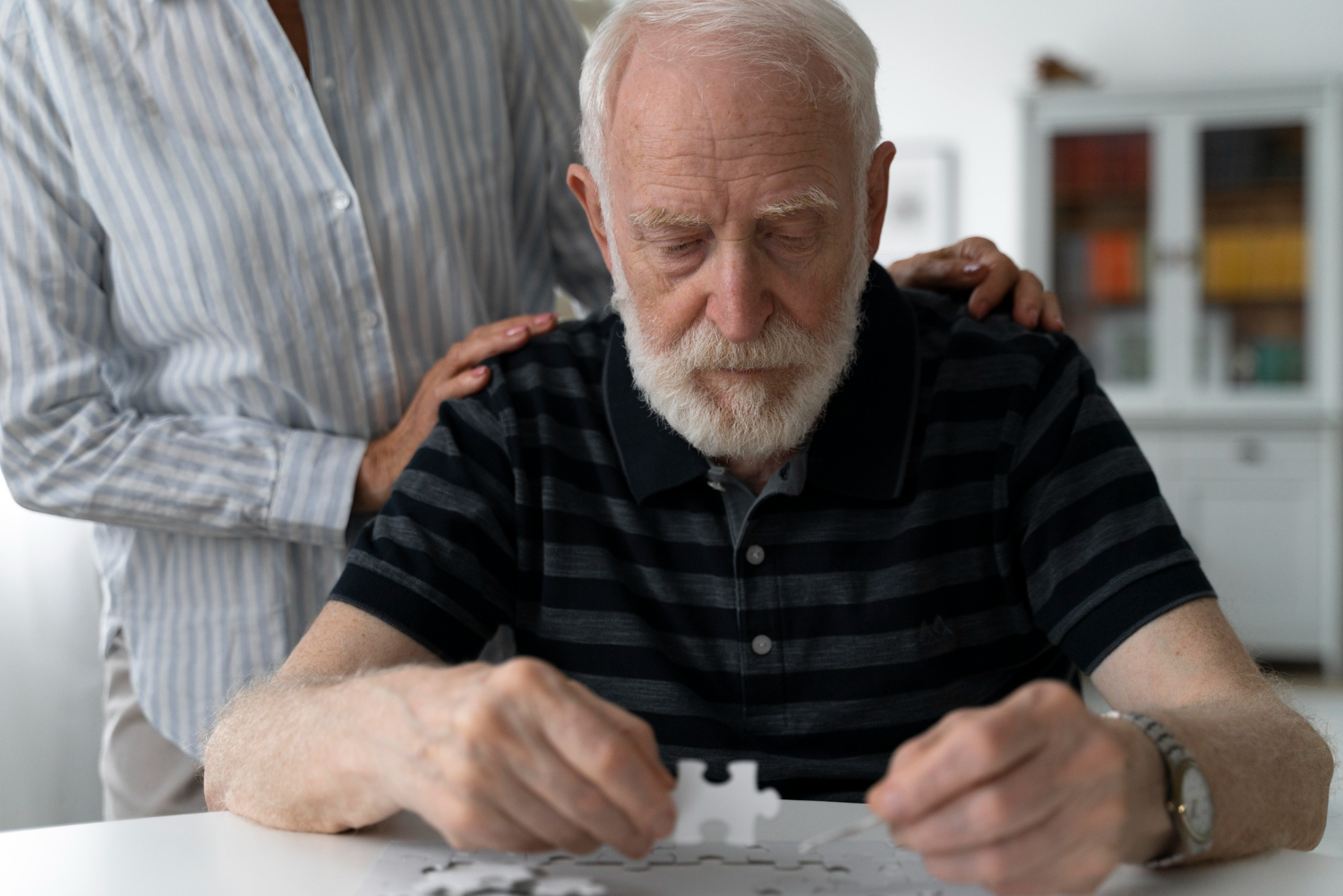A Guide to Caring for Your Loved One Living With Dementia
Dementia, a condition marked by cognitive decline, not only affects individuals but reverberates through the lives of their families. At Genuine Global Care, we recognize the challenges families face when caring for a loved one with dementia. This guide is designed to empower you with knowledge, practical advice, and emotional support as you navigate this intricate journey alongside your loved one.
What is Dementia
Dementia, in simple terms, is a general term for a decline in mental ability that’s severe enough to interfere with daily life. It’s not a specific disease but rather a group of symptoms related to impaired memory, communication, and problem-solving abilities. People with dementia may struggle to remember things, find the right words, or handle complex tasks. This condition can be caused by various diseases and injuries that affect the brain, with Alzheimer’s disease being the most common cause. Dementia not only affects memory but also impacts a person’s ability to carry out everyday activities, which can be challenging for both the individual and their loved ones. Understanding and patience are essential when supporting someone living with dementia.
Early Signs of Dementia
Common early signs of dementia can vary but often include subtle changes in memory, such as forgetting recent conversations or events. Individuals may struggle to find the right words, experience difficulty in completing familiar tasks, or lose track of time. Confusion about places, people, and events that should be familiar is another warning sign. Changes in mood and personality, like increased irritability, depression, or withdrawal from social activities, can also be indicative of early-stage dementia. Additionally, impaired judgment, such as poor decision-making or a decline in hygiene and grooming habits, might become noticeable. It’s important to note that these signs can be subtle and might be mistaken for normal aging initially. However, if you or your loved one is experiencing persistent or worsening symptoms, seeking medical advice for a proper evaluation is essential. Early detection enables better management and support, allowing individuals and their families to plan for the future effectively.
Dementia & Your Emotions as a Caregiver
Caring for a family member with dementia stirs up a whirlwind of feelings – frustration, sadness, but also love and resilience. It’s vital to accept and understand these emotions because they’re completely natural. You may feel frustrated when communication becomes difficult or when you see your loved one changing. There’s sadness in losing shared memories, but in the middle of it all, there’s love – the strong, enduring kind that fuels your caregiving. Embracing this mix of emotions is necessary. It helps you connect with your loved one on a deeper level and gives you the strength to deal with whatever comes your way. By taking care of your emotional well-being, you are better equipped to provide unwavering support to your loved one.
Words of Comfort: Dementia Communication Strategies
When it comes to communicating with a loved one who has dementia, it’s all about patience, empathy, and finding creative ways to connect. First and foremost, use a calm and soothing tone of voice. Speak slowly and clearly, giving them time to process what you’re saying. Maintain eye contact and use simple, straightforward sentences.
Non-verbal communication can be incredibly powerful. Smile, touch, and maintain a reassuring physical presence. These gestures can often convey more than words. Be an active listener; pay attention to their body language and respond to their emotions. Sometimes, it’s not just about what they say, but how they feel that matters most.
Additionally, engage in activities that trigger positive memories, like looking at old photographs or listening to their favorite music. Use visual cues, such as pointing or gesturing, to help convey your message. And most importantly, be patient. Give them the time to respond, even if it takes a while. Rushing or showing frustration can create unnecessary tension.
Remember, communication is not just about words; it’s about fostering a sense of emotional closeness. Be present, be understanding, and cherish the moments of connection, however small they might seem. In this way, you not only enhance communication but also strengthen the bond between you and your loved one, providing comfort and reassurance in the midst of their confusion.
Creating a Safe Environment at Home
Creating a safe and comfortable environment at home is paramount when caring for someone with dementia. Simple modifications and safety precautions can make a world of difference, enhancing their quality of life and providing peace of mind for both you and your loved one.
Home Modifications:
- Clear Pathways – Ensure that pathways are clear of clutter and obstacles to prevent tripping or falling.
- Proper Lighting – Well-lit spaces reduce confusion. Use nightlights in hallways and bathrooms to prevent disorientation during nighttime trips.
- Secure Carpets and Rugs – Secure loose carpets and rugs to the floor to prevent slipping hazards.
- Labeling and Color Coding – Label drawers, cabinets, and rooms clearly. Color coding can help identify different areas and objects easily.
Safety Precautions:
- Locking Cabinets: It may sound strange, but using childproof locks on cabinets containing hazardous items like cleaning supplies and medications is necessary in protecting your loved one with dementia.
- Stove Safety: Install an automatic stove shut-off device to prevent accidents. Remove stove knobs when not in use.
- Monitoring Devices: Consider using monitoring devices such as alarms or cameras to keep an eye on your loved one, especially if they tend to wander.
Familiar Objects and Spaces:
- Familiar Items: Surround your loved one with familiar objects, like favorite photos or cherished belongings. These can provide comfort and reassurance.
- Comfortable Spaces: Create comfortable spaces with familiar furniture. A favorite chair or blanket can bring a sense of stability and ease anxiety.
By making these modifications, you are effectively creating a safe, secure, and familiar environment for your loved one. This not only reduces their confusion and anxiety but also fosters a sense of stability, enabling them to navigate their daily life with greater confidence and peace of mind. Remember, the goal is to provide an atmosphere where they feel secure and loved, promoting their overall well-being.
Navigating Behavioral Changes
Behavioral changes, including aggression and withdrawal, are often distressing symptoms of dementia. Understanding the triggers behind these behaviors is the first step towards effective management. One of the essential tools in your caregiving kit is patience. Here are some practical strategies to help you navigate these challenging situations, emphasizing empathy and flexibility.
Identify Triggers:
- Observation: Pay close attention to the circumstances surrounding the behavioral change. Is it a specific time of day, a particular person, or a certain activity that triggers the behavior?
- Communication: Sometimes, the person with dementia might be trying to express a need or discomfort. Encourage them to communicate, even if it’s non-verbal, and try to decipher what they might be feeling.
Remain Calm and Patient:
- Stay Calm: Your calm demeanor is your best asset. Take deep breaths and remain composed. Your emotional state can influence theirs.
- Patience: Remember that dementia affects cognitive abilities. It might take time for your loved one to process information or respond to your cues. Be patient and give them the time they need.
3. Redirect Attention:
- Distraction: Sometimes, changing the topic or activity can redirect their focus. Offer a favorite snack, engage in a simple game, or listen to soothing music to shift their attention away from the distressing situation.
- Change of Environment: If possible, change the environment. Move to a different room or go for a short walk. A change in scenery can sometimes break the cycle of negative behavior.
4. Empathetic Communication:
- Validation: Acknowledge their feelings, even if you don’t agree with their perception of reality. Use phrases like “I understand you’re feeling upset” to validate their emotions.
- Reassurance: Offer reassurance and comfort. Hold their hand gently or offer a hug, whichever they find comforting. Physical touch can convey a sense of security.
5. Maintain Routine and Consistency:
- Predictability: Stick to a daily routine as much as possible. Predictability can provide a sense of stability and security, reducing anxiety-induced behaviors.
- Consistent Caregiving: Try to have the same caregivers if possible. Familiar faces can create a sense of safety for individuals with dementia.
6. Involve Them:
- Decision-making: Whenever feasible, involve your loved one in decision-making processes. It could be as simple as choosing what to wear or what to have for a meal. This fosters a sense of control and reduces frustration.
Remember, every individual with dementia is unique, so what works for one person might not work for another. Stay flexible, adapting your approach based on their responses. By approaching challenging behaviors with empathy, patience, and a calm demeanor, you not only defuse tension but also provide a comforting environment, promoting a sense of security and well-being for your loved one amidst the complexities of dementia.
Building a Supportive Network: You Don’t Have to Do It Alone
Caring for a loved one with dementia can be isolating. Building a supportive network is vital for your well-being. Genuine Global Care also offers respite care to provide you with the much-needed relief. Our respite care services are designed to give you a break, a chance to recharge, and an opportunity to focus on your own needs. Whether you need a few hours to run errands, attend appointments, or simply take a moment for yourself, our dedicated caregivers are here to step in.
By entrusting your loved one into our capable hands, you can have peace of mind, knowing that they are in a safe, caring environment. Respite care not only benefits you but also enriches your loved one’s life with new experiences and social interactions. It’s a win-win solution that ensures both you and your loved one receive the support you deserve. Let us be your partner in this journey, providing the assistance you need and the care your loved one deserves.
Conclusion: Your Journey, Our Support
Caring for a loved one with dementia is a profound and challenging journey. At Genuine Global Care, we are here to walk this path with you. By equipping yourself with knowledge, embracing your emotions, fostering effective communication, creating a supportive environment, and building a network, you empower yourself to provide the best possible care for your loved one.
Remember, you are not alone. Together, we navigate the complexities of dementia, ensuring that your loved one receives the compassionate care they deserve while safeguarding your own well-being. Contact us to learn more about how we can support you and your loved one.



